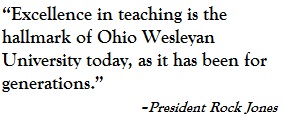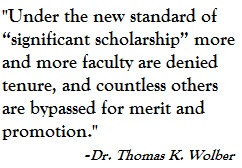By: Dr. Thomas K. Wolber
Like many small liberal-arts colleges, Ohio Wesleyan University is first and foremost a teaching institution. The school’s Code of Regulations states, “It shall be the primary function of the faculty to instruct the students in the arts and sciences, and in all branches of liberal and professional instruction, as taught in the best universities.” And the Statement of Aims reaffirms that core mission when it says, “the University has as its preeminent purpose to be a quality institution for teaching and learning.” Wherever you turn, you will hear echoes of that sentiment. President Rock Jones says frequently, “Excellence in teaching is the hallmark of Ohio Wesleyan University today, as it has been for generations.” And OWU’s website declares, “OWU’s faculty and staff are dedicated to student success, and they demonstrate that dedication in countless ways every day in every way. Students spend time with employees not only in classrooms and offices, but also over lunch, at a Battling Bishop athletic event, or other community-building opportunity. OWU faculty members and staff become important mentors and close friends, ready to help students find their way to personal and professional success. It’s all part of the Ohio Wesleyan experience.”
 However, that “Ohio Wesleyan experience” is now under assault. Dedicated teachers are denied tenure or promotion and relegated to second-class citizens and obscurity. Their commitment to students and efforts to bring out the best in them are deemed insufficient and inadequate under a misguided personnel policy that increasingly de-prioritizes and devalues teaching in favor of scholarly research (or creative endeavors).
However, that “Ohio Wesleyan experience” is now under assault. Dedicated teachers are denied tenure or promotion and relegated to second-class citizens and obscurity. Their commitment to students and efforts to bring out the best in them are deemed insufficient and inadequate under a misguided personnel policy that increasingly de-prioritizes and devalues teaching in favor of scholarly research (or creative endeavors).
OWU’s faculty is evaluated on the basis of the quality of their teaching (60 percent), research (30 percent), and service (10 percent). In theory, this sounds reasonable although, parenthetically speaking, the Code of Regulations does not mention an obligation to conduct research at all. It is also interesting to note that the U.S. Professors of the Year Awards Program, for which OWU recently nominated three individuals, requires “a scholarly approach to teaching and learning,” but no significant research record. The problem of OWU’s faculty personnel policy lies in its implementation. It has become so formulaic, draconian, and punitive that it has lost all sense of proportion and decency. In the past, if you were a passionate teacher you were assured success if you showed “evidence of scholarship” and provided dedicated service to the University. Not so now. Under the new standard of “significant scholarship” more and more faculty are denied tenure, and countless others are bypassed for merit and promotion.
I have seen this happen at other institutions. At top universities around the world, it’s “publish or perish.” The pressure to focus on publications is so great and all-consuming that there is little or no time for teaching and service. If you happen to be a dedicated and accessible teacher who cherishes spending time with students and in the classroom, it can mean the end of your academic career. Consider that every tutorial or independent study taught in addition to the regular course load means a diminished scholarly output. Every conversation with a prospective, current, or former student means another unread article. Every concert, exhibition, play, or sports event you go to because you want to support the students can be a distraction and disruption of your schedule as a researcher. Every letter of recommendation requires a level of care and time that may compete and conflict with scholarly endeavors. Helping students become better writers is a challenge when the quality and quantity of your own writing is very much at stake.
This is what I meant earlier when I wrote that OWU’s teaching mission is under threat. The pressure to publish or perish has finally reached this institution, too, and as a result teaching no longer has the unquestioned primacy. There is diminishing incentive to do so. The faculty-personnel committee has created a hostile work environment for people whose primary devotion is to teaching and a climate of fear for those who don’t conform to its norms. Teaching ranks low. Research is where the grants and resources, merit and promotion, fame and fortune are.
We are already seeing the deleterious effects of this misguided policy. Faculty in significant numbers refuse to serve on committees; many do not attend admissions events; some even show no interest in helping with student retention. After all, there is no money in sitting down with an advisee and point her in the right direction. I cannot blame these colleagues for acting rationally and in their own best interest. It is not their fault. They are reacting logically to a system that no longer puts students front and center. In a research-centered environment students are, to put it bluntly, little more than a nuisance and a bother.
As this unfortunate trend continues, disengaged faculty will spend less and less time with students. They will teach their classes and hold the requisite number of office hours, but that may well be it. Admission and retention efforts will suffer, the quality of advising will diminish, and students in need and distress may not get the full attention they deserve. This is not an apocalyptic doomsday scenario. The downhill trend is already in evidence, exacting a heavy toll. Ohio Wesleyan is currently experiencing difficulties meeting admission and retention targets. It may be an inconvenient truth, but I submit that this is, in part, a direct result of a flawed faculty-personnel policy that de facto elevates research over teaching, forcing teachers to make the difficult choice of putting students on the back burner. This wrongheaded approach undercuts OWU’s historic mission and has already done incalculable damage. The focus on faculty research has gone too far and is no longer an asset. Instead, it has become a risk and a liability that imperils the future of the college. OWU has strayed from its ethos and legacy. We need to recalibrate our values and priorities and find a better balance. Students and faculty, administrators and trustees must step up and demand that Ohio Wesleyan return to what it has been for almost 175 years – a premier teaching institution.
Dr. Thomas K. Wolber is an associate professor of German at Ohio Wesleyan. He teaches all levels of German language, literature and civilization. In addition to those subjects, he specializes in comparative literature and environmental studies.

